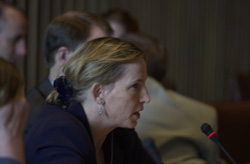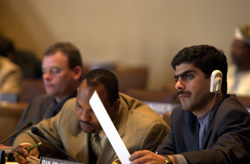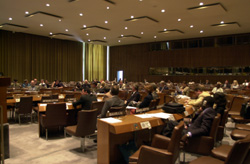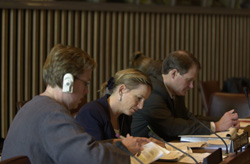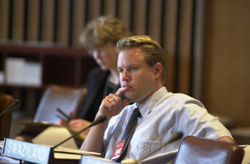|
|
|
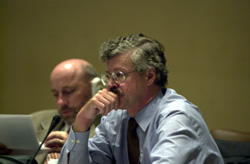
Regarding
NEW ZEALAND's proposal calling on CPF member organizations to
promote and support the use of C&I as a basis for country
reporting, the EU and US preferred stressing the importance of using
C&I as a basis for reporting on SFM. The G-77/CHINA recommended
further consultation on C&I
|
|
WORKING GROUP 2: |
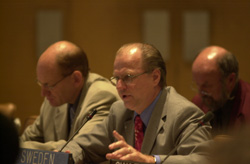
PLAN OF ACTION (PoA):
The EU proposed text
inviting ministers to endorse the PoA at UNFF-2, and acknowledging
countries' responsibilities for implementing proposals directed
at the national level. |
| |
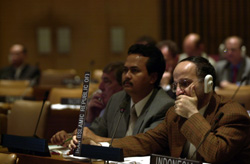
The
G-77/CHINA proposed text inviting countries to establish national
focal points. The EU suggested that national focal points
"guide and coordinate implementation and assessment of the
IPF/IFF proposals for action." The US opposed, noting
complications with making focal points responsible for
implementation. |
| |
|
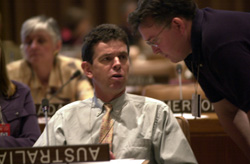
Regarding text
encouraging countries to systematically assess and analyze the
proposals for action, AUSTRALIA proposed adding "for
implementation relevant to their circumstances and
capabilities."
|
| |
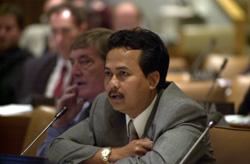
CANADA, with INDONESIA (Right), stressed that the PoA's
purpose is to provide guidance to the UNFF, and objected to
focusing on country action. |
| |
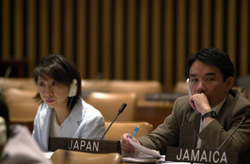
Regarding a paragraph deciding that MAR on progress in
implementation be based on voluntary national reporting, JAPAN
(Right) proposed adding MAR on progress toward SFM. |
| |
| CONTACT GROUP: |
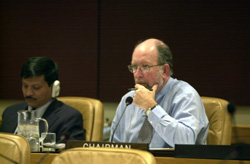
In a
contact group facilitated by Rob Rauson (Australia) (Right), delegates
discussed the format for the table of the suggested MYPOW
schedule, including topics to be discussed at the remaining UNFF
sessions, and how cross-cutting issues would be handled. |
| |
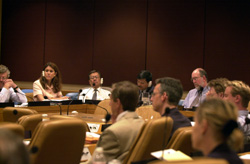
Delegates
reiterated that cross-cutting issues would be discussed in
relation to the thematic elements for each session, and that
sessions should focus on elements similar in substance for
manageability and to maximize the use of experts |
| |
| After
informal discussions, the US proposed a table grouping thematic
elements for the remaining UNFF sessions, and reflecting
categories on means of implementation and common agenda items for
all sessions. Delegates agreed that the US proposal addressed the
primary concerns but needed further work. |
| |
| SIDE EVENT:
Programme on Forests (PROFOR) |
|
PROFOR,
WORLD BANK AND FAO SIDE EVENT AT UNFF
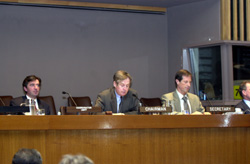 PROFOR
co-hosted a side event to the UNFF with the World Bank, FAO and
the NFP Facility at UN Headquarters on Tuesday, 19 June. PROFOR
co-hosted a side event to the UNFF with the World Bank, FAO and
the NFP Facility at UN Headquarters on Tuesday, 19 June.
Odin Knudsen, World Bank, provided an update of progress toward
finalizing the Bank's new Forest Strategy, noting the Bank's
intentions to host PROFOR in the context of the Strategy. He explained that the Strategy focuses on poverty
alleviation, sustainable development and global values as well as
knowledge generation, cross-sectoral impacts on forests and issues
relating to governance. Michael Martin, Director of Forest Policy
and Planning Division of the FAO, briefed participants on the
National Forest Programme Facility (NFP Facility), highlighting it
as a knowledge sharing platform that will be accessible to all
interested parties and the Facility's twining arrangement with
PROFOR. He described the NFP Facility as a response to the IFF and
the need for concrete action on the ground. Christian Mersmann,
Director, PROFOR, overviewed PROFOR's transition to its second
phase and described the new programme which will support NFP
processes in 16 client countries and serve as a knowledge creation
center, especially in regards to PROFOR's key thematic areas:
livelihoods, governance and financing SFM. In response to
questions, the various speakers stressed the importance of
collaboration and building on synergies in order for the NFP
Facility and PROFOR to meet countries' needs and to reach the
goal of NFP support and implementation on the ground. |
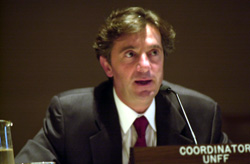 |
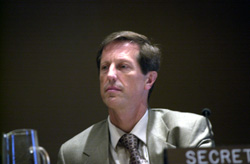 |
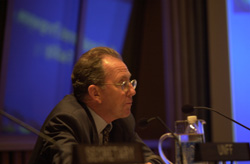 |
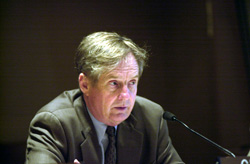 |
| |
| Above Photos
clockwise: Christian Mersmann of PROFOR moderated the event,
Michael Martin of FAO, Odin Knudsen of
WorldBank and James Ball (NFP Facility) |
|
| |


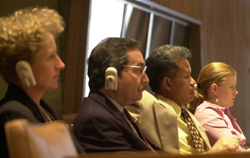
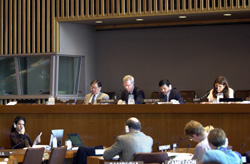 MYPOW: Thematic Focus and Categories: Delegates agreed to text
reaffirming that the MYPOW would address the principal functions of
the UNFF. Chair Øistad proposed compromise text reaffirming that
the MYPOW should reflect the three pillars of SFM, the tenets of
sustainable development and the criteria for SFM, as well as the
cross-cutting issues of finance, technology transfer, capacity
building and trade.
MYPOW: Thematic Focus and Categories: Delegates agreed to text
reaffirming that the MYPOW would address the principal functions of
the UNFF. Chair Øistad proposed compromise text reaffirming that
the MYPOW should reflect the three pillars of SFM, the tenets of
sustainable development and the criteria for SFM, as well as the
cross-cutting issues of finance, technology transfer, capacity
building and trade.